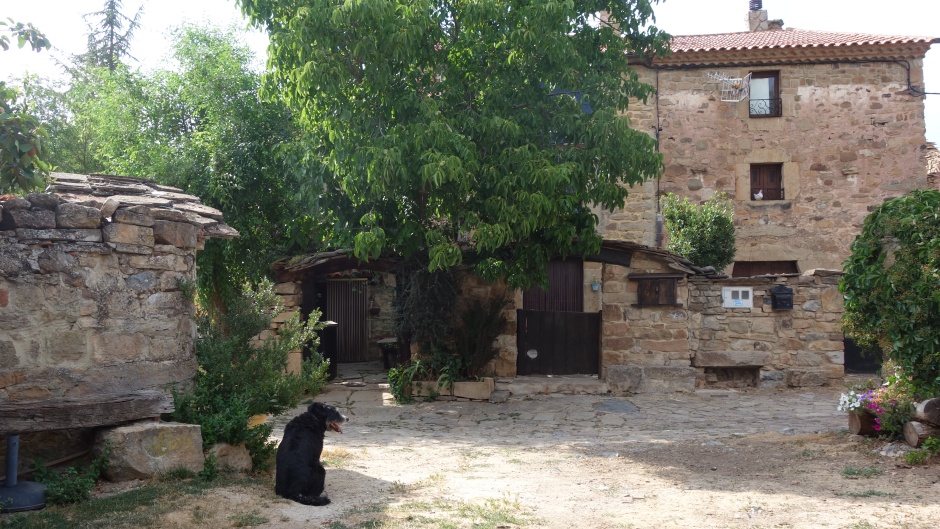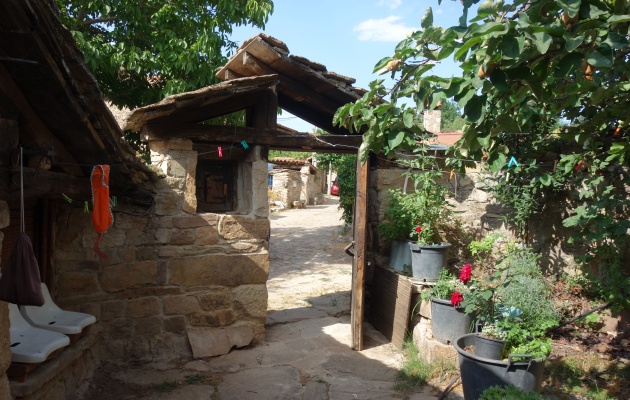Life in the village is more relaxed but surely less safe as well. Everything is ‘pointy’: the old pieces of furniture, the rocky ground, nails and other sharp materials in unexpected corners.
 A small village in the rural Spanish region of Soria. / Photo: J. Forster
A small village in the rural Spanish region of Soria. / Photo: J. Forster
“Nos vamos al pueblo” (We’re going to the village) is an expression heard in many Spanish homes as the summer vacation arrives. Families living in cities near the coast pack their cars and hit the road in journeys of over 500 kilometres towards the interior of the country. It is an almost sacred tradition - an annual trip back to the rural villages their grandparents left decades ago as they were looking for a better life in the industrialised areas.
In the pueblo, one can enjoy the invaluable cool nights as heatwaves of over 40 degrees become increasingly common in the south of Europe. The old stone houses and the often-unpaved streets are a reminder of past times. Dogs, chicken, sheep, and all kinds of other bugs here are the delight of children.
But spending the summer in the pueblo is also getting out of your comfort zone. Internet connection does not always work, there are no large supermarkets nearby, and the playgrounds are old and rusty. Life in the village is more relaxed but surely less safe as well. Everything is more ‘pointy’: the old pieces of furniture, the rocky ground, nails and other sharp materials in unexpected corners. Children love the new scenarios to explore but parents have to make extra efforts to foresee potential dangers.

[photo_footer] A small village in the rural Spanish region of Soria. / Photo: J. Forster [/photo_footer] All this is a good reminder of the real world for those of us who increasingly live in low-risk urban environments where technology disconnects us from the material world. That is what Byung-Chul Han (a Korean philosopher based in Germany) says. In his book “Undinge” (2021) he evocatively describes how more and more things disappear in our digitalised cultures. As everything is moved online, technologies make our relationship with tangible objects less needed. Our predictable smartphones turn material realities into simple information. In a ‘user-friendly’ digital world built around our personal wellbeing, potential dangers are eliminated and interactions with the world seem to become risk-free.
Returning for some days to the village of our grandparents is a good exercise of pricking our virtual bubble. Spending time in raw nature reminds us of the Creator of a wonderful world, with rivers, clouds, forests and hills to climb, realities no VR (Virtual Reality) technology will ever be able to reproduce in its fullness. But nature also reminds us that no matter how much we humans try to create zero-risk contexts, we will never be able to escape the reality of a fallen world, an ‘pointy’ material reality in which there is suffering, pain… and sin.
Here, sitting quietly in a plastic chair outside our house in the pueblo, I am reminded once again that the Christian faith is all about a God that entered our physical and material reality. He engaged with our real world, “being made in human likeness” (Phil. 2:7). May that encourage us to break our own wellbeing bubbles to re-connect with the world around us, starting with the people living close to us.
This article was first published in Finnish on Uusi Tie magazine.

Las opiniones vertidas por nuestros colaboradores se realizan a nivel personal, pudiendo coincidir o no con la postura de la dirección de Protestante Digital.
Si quieres comentar o